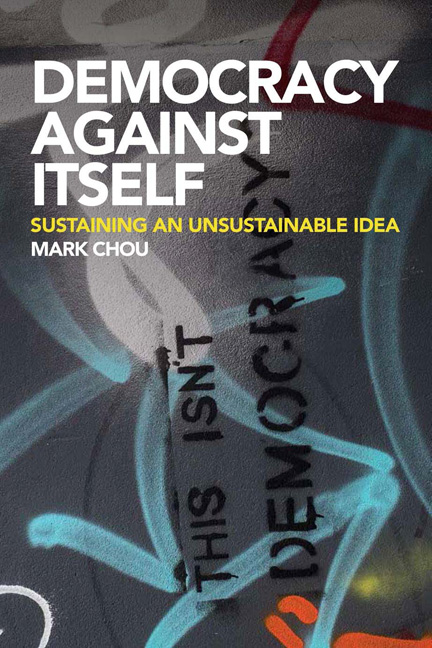Book contents
- Frontmatter
- Contents
- Introduction
- 1 Democracy Against Itself
- 2 Democracy in Athens: Autonomy, Tragedy and Decline
- 3 Democide in Weimar: Militant Democracy and the Paradox of Self-Defence
- 4 The Coming Authoritarianism: The State of America's Democracy
- 5 China's New Authoritarianism: A Glimpse at Our Post- Democratic Future?
- 6 Occupy Democracy: Democracy Against Itself and the Global Occupy Movement
- Bibliography
- Index
4 - The Coming Authoritarianism: The State of America's Democracy
Published online by Cambridge University Press: 07 December 2017
- Frontmatter
- Contents
- Introduction
- 1 Democracy Against Itself
- 2 Democracy in Athens: Autonomy, Tragedy and Decline
- 3 Democide in Weimar: Militant Democracy and the Paradox of Self-Defence
- 4 The Coming Authoritarianism: The State of America's Democracy
- 5 China's New Authoritarianism: A Glimpse at Our Post- Democratic Future?
- 6 Occupy Democracy: Democracy Against Itself and the Global Occupy Movement
- Bibliography
- Index
Summary
In late 2011, The Wall Street Journal published an article with the curious title ‘Democrats Against Democracy’. Written by James Taranto, one of the Journal's conservative columnists, the piece documented a disturbing trend seen to be besetting democracy in America. Taranto claimed that American citizens, especially those who identified themselves as liberal and progressive, were increasingly turning their backs on democracy. Quoting from a New York Times editorial by Nicholas Kulish, Taranto observed that: ‘From South Asia to the heartland of Europe and now even to Wall Street, these protesters share something else: wariness, even contempt, toward traditional politicians and the democratic political process they preside over.’ Taking to the streets is thus seen as the next best thing for citizens who now ‘have little faith in the ballot box’; protest and dissent is the political act of choice for voters who no longer see democracy as accountable, workable or worthy of their patronage. Though these disaffected democrats may not necessarily be ‘agitating for a dictator to take over’, a point Kulish emphasises in his article, their displeasure at democracy and their desire for change is nonetheless distressing. It is distressing because there is much here that is evocative of the recent movements which culminated with the overthrow of dictators in Egypt, Tunisia, Libya and Yemen. And that is Taranto's worry.
Indeed, for Taranto, the disaffection now working its way into democracy in the United States is similar to what has been felt in quarters of the globe where democracy was never anything more than an uncertain experiment in political governance. The rally cry that ‘voting is worthless’, that democracy is all promise and no delivery, is ‘increasingly heard in America’, as Taranto writes; and this is a gripe not solely heard ‘from street protestors but from traditional politicians, especially Democrats, and their supporters in the liberal elite media’. That is the shift which most concerns Taranto: the one which sees democrats in the United States turning away from their democracy.
- Type
- Chapter
- Information
- Democracy Against ItselfSustaining an Unsustainable Idea, pp. 77 - 109Publisher: Edinburgh University PressPrint publication year: 2014



